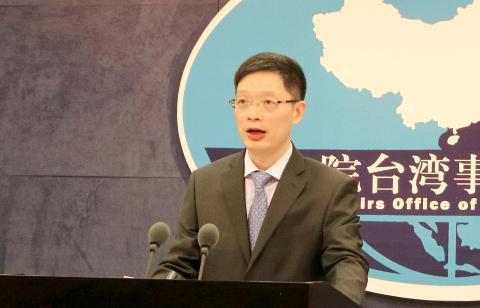China’s Taiwan Affairs Office (TAO) yesterday said Beijing has extended economic benefits and subsidies to Taiwanese businesses, civic groups, cultural workers and artists in China that were previously exclusively for Chinese citizens, a step that critics said represents an escalation in Beijing’s use of “united front” tactics.
Hailing the measures as “unprecedented,” TAO spokesman An Fengshan (安峰山) said the 31 incentives, effective immediately, would allow “Taiwanese compatriots to share in the opportunities arising from China’s economic development.”
The incentives seek to bring an “equality of opportunity” to Chinese and Taiwanese who are studying, starting businesses, working or living in China, An said.

Photo: CNA
The policy applies to Taiwanese businesses and entities involved in a wide variety of commercial and noncommercial activities.
The incentives include permitting Taiwanese firms to invest in Chinese businesses, receive tax breaks, participate in the “Made in China 2025” initiative and National Key Research and Development Programs, bid for government procurement contracts, and manage semi-public enterprises, the TAO said.
Beijing is also encouraging the involvement of Taiwanese entrepreneurs in the Belt and Road Initiative, particularly in China’s midwestern and northeastern regions, it said.
Taiwanese-owned agricultural entities are to receive the same subsidies and benefits that are available to their Chinese counterparts, it added.
Taiwanese are now eligible to enroll in certification exams for 134 professions and become members of Chinese industry associations and trade groups to “take part in work at the grassroots level,” the TAO said.
Beijing is to relax restrictions on cross-strait cooperation in film and TV productions to facilitate collaboration, it said, adding that restrictions on Taiwanese publications and films marketed in China have been removed.
Taiwanese are now eligible to register for and win prizes and awards in the Chinese Cultural Heritage Development Excellence competition, it added.
The 31 incentives were “tailor-made” for Taiwanese, he said.
The Mainland Affairs Council said that it was aware of Chinese efforts to induce Taiwanese to trade political recognition for profit and that it would be on alert regarding such developments and their potential effects on Taiwanese industry and skilled workers.
Such endeavors over the past few years have been attempts to turn Taiwanese by trying prove the validity of China’s claims, the council said.
Taipei has placed significant emphasis on policies that would improve Taiwan’s economy, grow its technology industry and foster skilled workers among the younger generation, it said.
The council called on China to work toward introducing mutually beneficial policies that are free of political manipulations, saying that only then could benign cross-strait interactions be maintained.
Many of the measures and policies announced by China require interagency collaboration, so whether Beijing actually has such plans and the actual rate of implementation of such policies remains to be seen, the council said.
The council cautioned Taiwanese that there are differences in systems, regulations, market environment and values across the Taiwan Strait, saying that they should be circumspect in their risk assessment to maintain their rights and safety.
Additional reporting by CNA

CHAOS: Iranians took to the streets playing celebratory music after reports of Khamenei’s death on Saturday, while mourners also gathered in Tehran yesterday Iranian Supreme Leader Ayatollah Ali Khamenei was killed in a major attack on Iran launched by Israel and the US, throwing the future of the Islamic republic into doubt and raising the risk of regional instability. Iranian state television and the state-run IRNA news agency announced the 86-year-old’s death early yesterday. US President Donald Trump said it gave Iranians their “greatest chance” to “take back” their country. The announcements came after a joint US and Israeli aerial bombardment that targeted Iranian military and governmental sites. Trump said the “heavy and pinpoint bombing” would continue through the week or as long

TRUST: The KMT said it respected the US’ timing and considerations, and hoped it would continue to honor its commitments to helping Taiwan bolster its defenses and deterrence US President Donald Trump is delaying a multibillion-dollar arms sale to Taiwan to ensure his visit to Beijing is successful, a New York Times report said. The weapons sales package has stalled in the US Department of State, the report said, citing US officials it did not identify. The White House has told agencies not to push forward ahead of Trump’s meeting with Chinese President Xi Jinping (習近平), it said. The two last month held a phone call to discuss trade and geopolitical flashpoints ahead of the summit. Xi raised the Taiwan issue and urged the US to handle arms sales to

BIG SPENDERS: Foreign investors bought the most Taiwan equities since 2005, signaling confidence that an AI boom would continue to benefit chipmakers Taiwan Semiconductor Manufacturing Co’s (TSMC, 台積電) market capitalization swelled to US$2 trillion for the first time following a 4.25 percent rally in its American depositary receipts (ADR) overnight, putting the world’s biggest contract chipmaker sixth on the list of the world’s biggest companies by market capitalization, just behind Amazon.com Inc. The site CompaniesMarketcap.com ranked TSMC ahead of Saudi Aramco and Meta Platforms Inc. The Taiwanese company’s ADRs on Tuesday surged to US$385.75 on the New York Stock Exchange, as strong demand for artificial intelligence (AI) applications led to chip supply constraints and boost revenue growth to record-breaking levels. Each TSMC ADR represents

State-run CPC Corp, Taiwan (CPC, 台灣中油) yesterday said that it had confirmed on Saturday night with its liquefied natural gas (LNG) and crude oil suppliers that shipments are proceeding as scheduled and that domestic supplies remain unaffected. The CPC yesterday announced the gasoline and diesel prices will rise by NT$0.2 and NT$0.4 per liter, respectively, starting Monday, citing Middle East tensions and blizzards in the eastern United States. CPC also iterated it has been reducing the proportion of crude oil imports from the Middle East and diversifying its supply sources in the past few years in response to geopolitical risks, expanding